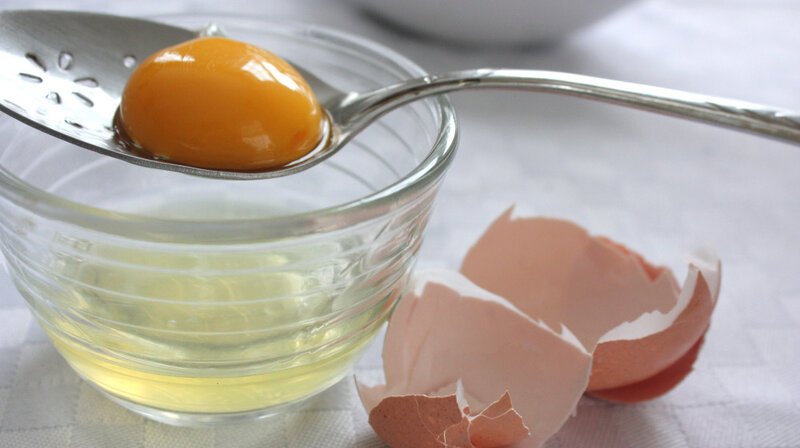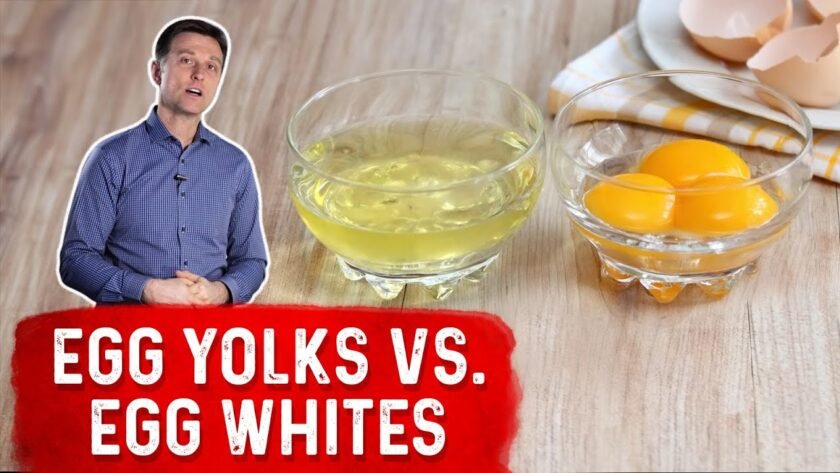Table of Contents
Eggs have long been a staple in diets worldwide, but misconceptions about their nutritional value and health impacts persist. This article delves into the latest research and expert opinions to uncover the truth about eggs. From the superior benefits of egg yolks to debunking cholesterol myths, we’ll explore why eggs deserve a place in your daily diet.
1. Egg Yolk vs Egg Whites – Which One is Healthier?
- Egg yolk is more nutritionally beneficial
- Yolk contains protein in a ratio close to egg white (2.7g vs 3.6g)
- Yolk is rich in vitamins and minerals such as calcium, zinc, selenium, and B vitamins
2. What are the health benefits of egg yolk?
- Contains healthy DHA fats beneficial for brain and memory
- Rich in phospholipids important for cell and brain health
- Source of vitamin K2 which helps remove calcium from arteries and strengthens bones
- Contains choline that helps remove fat from the liver and supports brain functions
3. Do eggs raise cholesterol?
- Eating eggs does not significantly increase cholesterol levels
- The body produces 3000mg of cholesterol daily (equivalent to 14 eggs)
- Consuming eggs only increases good cholesterol
4. What is the best type of eggs to buy?
- Look for organic, pasture-raised eggs
- Avoid eggs labeled only as “free-range” or “natural”, as these terms are not precise
- Organic eggs ensure no use of genetically modified feed or pesticides
5. How many eggs can be eaten daily?
- Dr. Berg consumes 4 eggs every morning
- Eggs are safe and beneficial for most people
- Eggs can be consumed regularly without concern for negative health effects
| Nutrient | Egg White | Egg Yolk |
|---|---|---|
| Protein | 3.6g | 2.7g |
| Calcium | 2.3mg | 21.9mg |
| Phosphorus | 5mg | 66.3mg |
| Potassium | 53mg | 18.5mg |
| Sodium | 54mg | 8.2mg |
| Zinc | 0.1mg | 0.4mg |
| Selenium | 6.6mcg | 9.5mcg |
| B1 | 0.01mg | 0.3mg |
| Folate | 1.3mcg | 24.8mcg |
| B12 | 0.03mcg | 0.331mcg |
| A | 0IU | 245IU |
| E | 0IU | 0.684IU |
| D | 0IU | 18.3IU |
| K | 0IU | 0.119IU |
| DHA | 0mg | 94mg |
| Carotene | 0mcg | 21mcg |
So let’s dive into the details…
We’re going to talk about egg yolks versus egg whites today. Okay, the first thing I want to talk about is a misconception that the egg white is healthier than the egg yolk.
- Common misconception: egg whites are healthier than egg yolks
Egg yolk vs. egg whites – which one is healthier?

Take a look at this nutritional profile. Protein – you realize that the egg yolk has, I mean, almost as much protein as the white. It has 2.7 grams versus 3.6 grams. I mean, that’s amazing. You would think it’s just all fat and cholesterol. No, it’s protein.
- Egg yolk: 2.7g protein
- Egg white: 3.6g protein
Calcium – ten times more calcium than the egg whites: 21.9 milligrams versus 2.3 milligrams for the white. The government phosphorus – 66.3 versus 5 milligrams.
potassium – well, look at the whites are a little more potassium. Zinc – it has more zinc. It has more selenium, more B1, more folate (that’s the B vitamin). It has a heck of a lot more B12, and basically, it has all the fat-soluble vitamins: vitamin A, D, and K1 and K2.
- Egg yolk has more calcium, phosphorus, zinc, selenium, B1, folate, and B12
- Egg yolk contains fat-soluble vitamins A, D, K1, and K2

Okay, so those are things that people need, and also DHA, which is a healthy fat that your brain needs, which will improve memory and things like that.
So hands down, you know, shoot the egg white away and just consume the yolk. Now, this king egg yolk is way more nutritious than egg whites.
- Egg yolk contains DHA, a healthy fat for brain function
- Egg yolk is more nutritious than egg white
It also has tons of what’s called phospholipids. Those are basically things that are surrounding the cellular membranes. It’s actually your brain needs to function, so it’s really good for cell and brain health.
Vitamin K2, I mentioned that before. What is vitamin K2? Well, the chicken eats the grass hopefully, or even the cow eats the grass if you’re talking about milk, and what happens is we convert K1 to K2.
- Egg yolk contains phospholipids for cell and brain health
- Vitamin K2 is present in egg yolks from grass-fed chickens
Vitamin K2 is very different than vitamin K1. Vitamin K1 has to do with clotting factors. Vitamin K2 is a vitamin that will remove calcium from the wrong place.
It will extract calcification from the arteries. It takes out calcium from the joints, so it decalcifies the arteries. So it’s great for lowering blood pressure.
It’s great for making the arteries elastic, and also it makes your bones really, really strong and hard. So we need vitamin K2.
- Vitamin K2 removes calcium from arteries and joints
- K2 helps lower blood pressure and strengthen bones
Vitamin K2 is a fat-soluble vitamin, and it’s in goose liver. It’s in butter. It’s in fatty or things that are grass-fed. It’s also – you can get it in natto. If you – it’s like a fermented soybean, but it’s pretty nasty tasting. And you can get it in a supplement, but vitamin K2 is actually in egg yolks if it’s grass-fed.
The importance of choline in egg yolks

Now let’s talk about choline. Where’s choline? It’s a B vitamin that helps pull fat out of the liver. It’s a little traffic B vitamin that will help your liver and also help the brain.
And it’s a precursor to what’s called neurotransmitters, which are like hormone-like beings within the nervous system. But the egg is loaded with choline.
- Choline helps remove fat from the liver
- Choline supports brain health and neurotransmitter production
- Eggs are rich in choline
Biotin and its importance
Let’s talk about biotin. Biotin is intimately involved with proteins, especially your hair, nails. So if you consume like egg whites raw, for example, there’s a protein in there that will block the absorption of biotin and create a biotin deficiency, and you may lose your hair if you consume a lot of raw egg whites. So we want to cook the egg whites and keep the egg yolks fairly raw.
- Biotin is important for hair and nail health
- Raw egg whites can block biotin absorption
- Cook egg whites, but keep yolks relatively raw
Why eggs don’t cause high cholesterol

Okay, but yeah, biotin is very, very important here. Also, there’s a concern about cholesterol. People think that it’s going to worsen their cholesterol.
It’s not, not to mention that there’s the choline and also lecithin in eggs, which actually are the antidote to cholesterol.
Here’s the fact: your body makes a lot of cholesterol – 3,000 milligrams of cholesterol every single day. That’s equivalent to 14 eggs, 333 strips of bacon, or a pound of butter.
That’s how much cholesterol that our body makes. So if you’re concerned about getting high cholesterol with eggs, you don’t have to be concerned.
- The body produces 3,000mg of cholesterol daily
- Equivalent to 14 eggs, 333 bacon strips, or 1 pound of butter
- Consuming eggs doesn’t significantly impact cholesterol levels
The only thing that will increase when you consume eggs is the good cholesterol. If you consume more cholesterol, your body will just make less.
unless there’s a genetic effect that you have, which is very rare, by the way. And if that’s the case, then maybe you consume something like a red yeast rice, okay, as an extract that will help you lower cholesterol naturally.
The best kinds of eggs to buy

Now the other point I would make about eggs is that when you buy eggs, it says free-range, natural, like chickens that are roaming – all that is just like, it doesn’t mean anything.
You want to get pasture-raised. Okay, not pasteurized, pasture-raised. That means that these chickens actually go into the pasture and the grass, and they consume the grass and the bugs and things like that. And we want organic, both of those.
- Look for pasture-raised eggs, not just free-range or natural
- Choose organic eggs
Okay, it has to be pasture-raised and organic. Why? Because the feed that they feed chickens mainly is soy and corn.
And I mean, it’d be nice that they just consume grass, but the problem if they use corn and soy, at least make sure that’s organic because if not, it’s GMO, and you’re consuming pesticides and you’re consuming a lot of other issues.
- Conventional chicken feed often contains GMO soy and corn
- Organic feed ensures no GMOs or pesticides
So unfortunately, most all the feed for chickens and other animals are corn and soy. But if it’s organic, it’s at least it’s not GMO. Okay, so go ahead and start consuming eggs. There’s not a problem.
I consume four eggs every single morning, and I’m still alive. So I’m sure it’s going to be fine for you too. Thanks for watching.
- Dr. Berg consumes 4 eggs every morning
- Eggs are safe and beneficial for most people
Summary
Most people believe that egg whites are far healthier than egg yolks. However, the data tells a different story. Take a look.
| Nutrient | Egg White | Egg Yolk |
|---|---|---|
| Protein | 3.6g | 2.7g |
| Calcium | 2.3mg | 21.9mg |
| Phosphorus | 5mg | 66.3mg |
| Potassium | 53mg | 18.5mg |
| Sodium | 54mg | 8.2mg |
| Zinc | 0.1mg | 0.4mg |
| Selenium | 6.6mcg | 9.5mcg |
| B1 | 0.01mg | 0.3mg |
| Folate | 1.3mcg | 24.8mcg |
| B12 | 0.03mcg | 0.331mcg |
| A | 0IU | 245IU |
| E | 0IU | 0.684IU |
| D | 0IU | 18.3IU |
| K | 0IU | 0.119IU |
| DHA | 0mg | 94mg |
| Carotene | 0mcg | 21mcg |
Eggs are loaded with phospholipids, choline, and biotin. Egg yolks also contain vitamin K2, the vitamin that helps transport calcium through the body and helps avoid calcification in the arteries and joints.
Make sure you get organic, pasture-raised eggs. Counter to what many people suggest, eggs do not cause high cholesterol.
DATA
https://time.com/4536939/egg-white-yolk-cholesterol
https://www.hsph.harvard.edu/event/nutrition-and-global-health-career-panel/
FAQ
Which part of an egg is the healthiest?
Both the egg white and yolk provide unique health benefits:
- Egg Whites: High in protein, low in calories, and virtually fat-free[2][3]. They are an excellent source of riboflavin and selenium[2].
- Egg Yolks: Contain most of the egg’s vitamins, minerals, and beneficial compounds like choline, lutein, and zeaxanthin[2][4]. The yolk also provides the majority of the egg’s fat content, which helps absorb fat-soluble vitamins[2].
What is the healthiest way to eat eggs?
The healthiest way to prepare eggs is to cook them without adding excessive amounts of fat or salt. Some of the healthiest cooking methods include:
- Boiling: Hard-boiled or soft-boiled eggs are a simple, healthy option[3].
- Poaching: Poached eggs are cooked without added fat and can be a nutritious choice[2].
- Scrambling: Scrambled eggs can be healthy if cooked with minimal added fat and seasoned with herbs and spices instead of salt[2].
- Over-easy or sunny-side up: Fried eggs prepared this way use less oil compared to fully fried eggs[3].
Is it okay to eat egg whites every day?
Eating egg whites every day is generally considered safe and healthy for most people. A large egg white contains about 4 grams of protein and is low in calories, with only 17 calories per white[2][3]. However, it’s important to consume egg whites as part of a balanced diet and not exceed your daily protein needs. The recommended dietary allowance (RDA) for protein is 0.8 grams per kilogram of body weight for adults[4]. Consuming egg whites in moderation, along with a variety of other protein sources, can be a nutritious part of a healthy diet. If you have any underlying health conditions, it’s best to consult with a healthcare professional before significantly increasing your egg white intake.
Egg yolk vs egg white: which one is healthier for weight?
Both egg yolks and whites can be part of a healthy diet for weight management:
- Egg Whites: Lower in calories and higher in protein compared to yolks, making them a good choice for those looking to increase protein intake while limiting calories[2][3].
- Egg Yolks: Provide beneficial nutrients like vitamins, minerals, and choline, which may support overall health[2][4]. The fat in yolks also helps absorb fat-soluble vitamins[2].
For weight loss, the healthiest approach is to consume whole eggs in moderation as part of a balanced, calorie-controlled diet that includes a variety of nutrient-dense foods[4]. Focusing on portion control, regular physical activity, and overall dietary quality is more important for weight management than emphasizing one part of the egg over the other.
Which part of the egg has more protein: white or yolk?
The egg white contains more protein than the yolk:
- Egg Whites: Contain approximately 10.9% protein by weight[1]. A large egg white provides about 3.6 grams of protein[4].
- Egg Yolks: Contain around 15.9% protein by weight[1]. A large egg yolk provides about 2.7 grams of protein[3][4].
While egg yolks contain a significant amount of protein, the white provides a higher proportion of the egg’s total protein content[1][3]. However, both the white and yolk contribute to the egg’s overall high-quality protein profile, which includes all nine essential amino acids[2][4].
Protein in one egg white (boiled)
A large boiled egg white contains approximately 3.6 grams of protein[4].
Protein in one egg yolk
A large egg yolk contains about 2.7 grams of protein[3][4].
Protein in 1 egg white
A large raw egg white contains 3.6 grams of protein[4].




